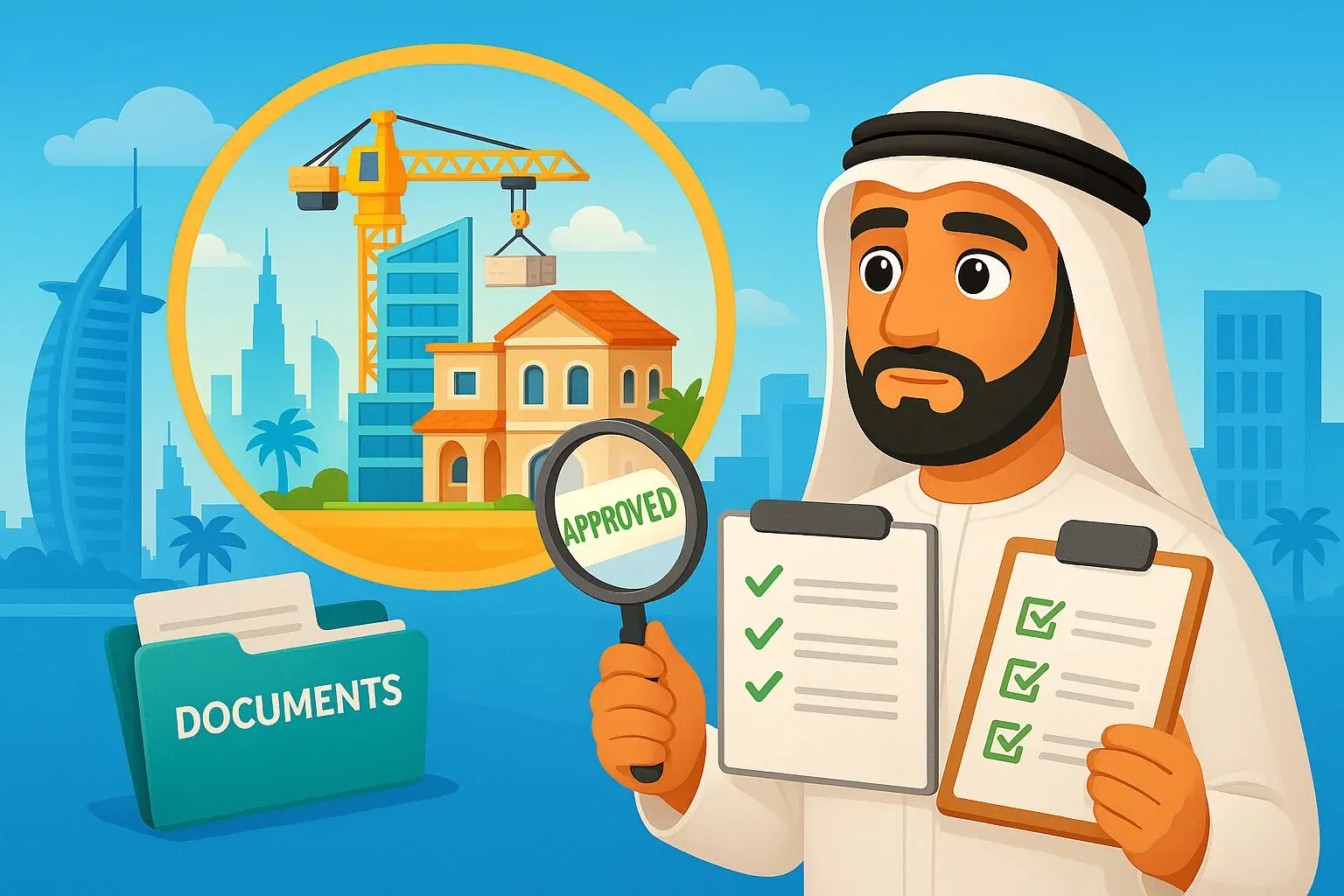Not theory. Not hype. But the real-world lessons no agent, influencer, or glossy brochure will ever show you.
If you’re serious about investing in Dubai — this might save you a six-figure mistake.
1. Gross ROI Means Nothing. Net ROI = Reality.
That 9% yield? After deductions — fees, void periods, agency cuts — I banked 4.3%.
📉 My mistake: I believed the brochure.
What to do instead:
Always run a full net ROI calculator with real data — including service charges, maintenance reserves, and void assumptions.
📌 This is the difference between cashflow and just owning a shiny asset.
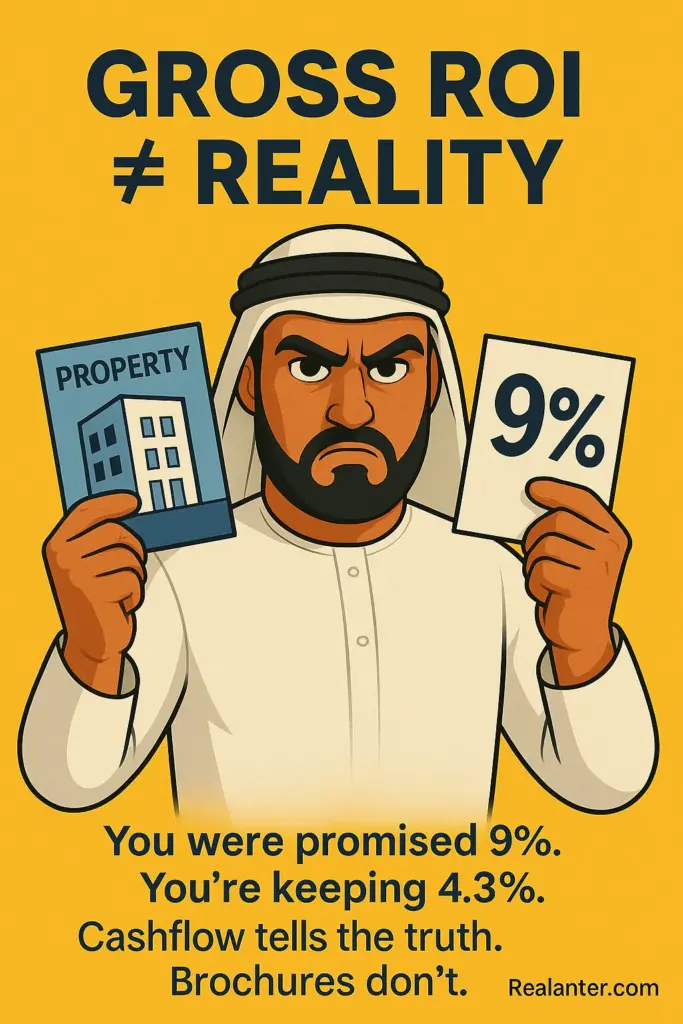

2. Not All Agents Want You to Win
My first “advisor” sold me the last unit in a tower. Turns out it was dead inventory with no resale demand.
🧠 What I learned: Many agents are incentivized to sell what pays them best — not what serves you best.
What to do instead: Work with agents who show past performance data, resale timelines, and say “no” to bad deals.
Ask: Would they buy this unit with their own money?
3. “Hot District” Doesn’t Mean Smart Investment
I bought in a booming area. But my specific unit? Low visibility, poor finish, high turnover.
📉 ROI: 3.1% 📈 Same building, another stack: 5.9%
What to do instead:
Focus on micro-location, not district buzz. Check what units resell fast, rent quickly, and hold value over time.
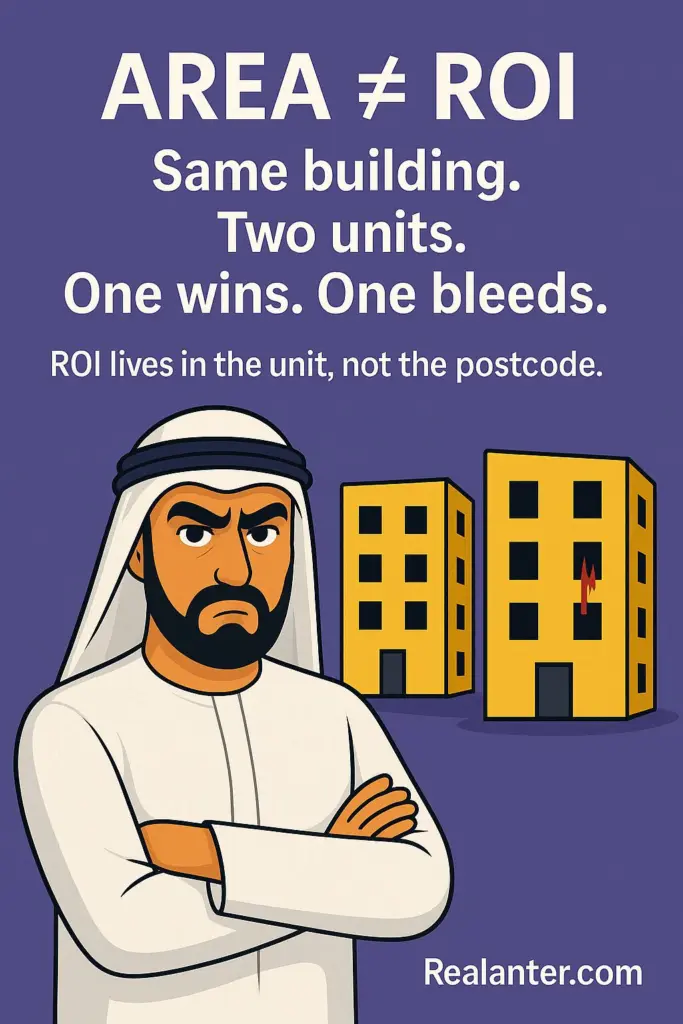

4. Off-Plan ≠ Discount. It’s Risk with a Ribbon.
I entered off-plan expecting capital appreciation.
The project delayed by 18 months. Zero rent, zero ROI.
What to do instead:
Only buy off-plan from Tier-1 developers with RERA approvals, transparent escrow accounts, and handover guarantees.
Add 1–2 years to projected timeline in your ROI.
5. Short-Term Rental is a Business — Not Passive Income
I listed two units on Airbnb. One worked. One bled cash due to damage, low-season voids, and mismanagement.
What to do instead:
If you go short-term, hire professional STR operators, automate guest communication, track seasonality, and keep 3 months’ reserve.
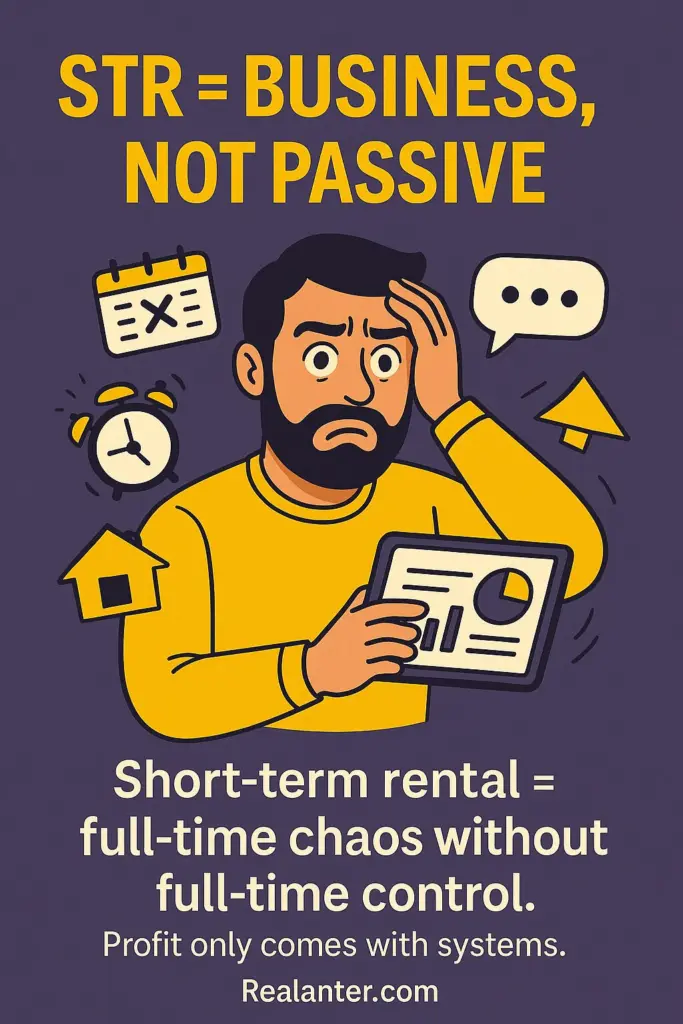

6. Exit Plan First. Always.
I bought a luxury unit with “long-term potential.”
When I needed to sell — no buyers, no interest, no liquidity.
What to do instead:
Plan your resale before you buy.
Ask: “If I had to exit in 12 months, who’s my buyer?”
7. Never Skip the Legal Layer — It’s What Saves You
I overlooked escrow registration and handover penalties.
Later, I had no leverage when construction stalled.
What to do instead:
Demand a legal document review. Check RERA approval, payment plan clauses, and refund policy.
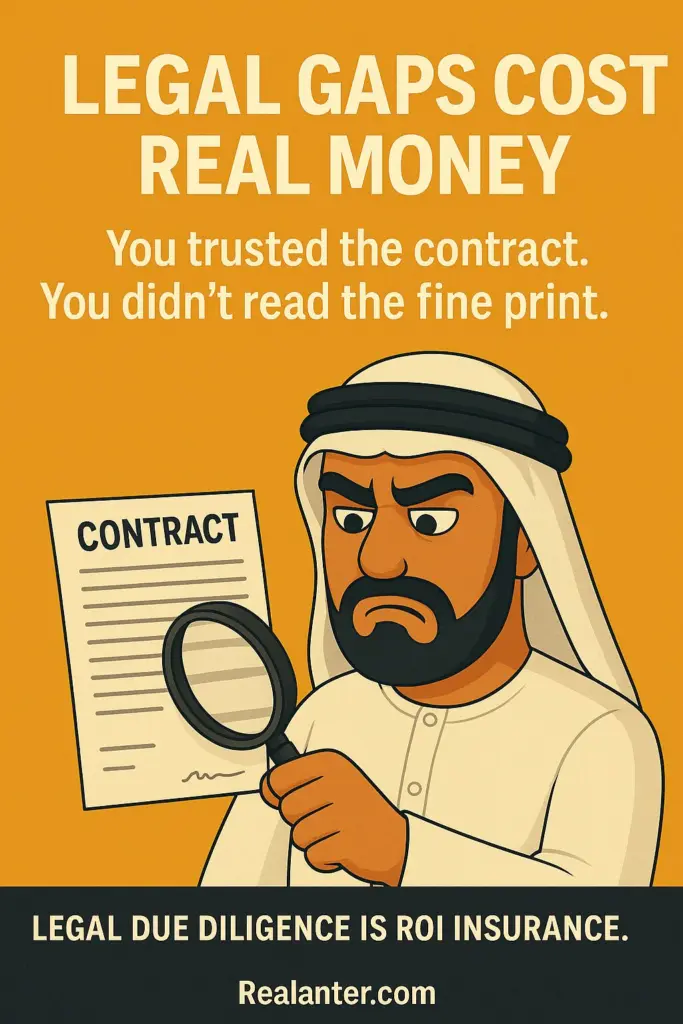

8. Bank Fees & Exchange Rates Can Kill Your Margin
Between transfer charges, mortgage setup fees, DLD taxes, and currency exchange spread — I lost ~$17,000 I hadn’t budgeted.
What to do instead:
Add 5–6% buffer to your deal total for hidden financial friction.
Use UAE-based banks or FX platforms to reduce spread.
9. “Investor Visa ROI” Is Often Overhyped
I was offered a “visa-qualifying” property. But it had poor yield and zero resale appeal.
What to do instead:
Don’t choose property for visa.
Choose visa based on the investment that makes sense — then structure it through company ownership or a qualifying asset.


10. Dubai Is a Real Market — Not a Fantasy Playground
There are wins here. Real wins. But only if you respect it like any serious financial move.
What to do instead:
Think like a portfolio manager, not a tourist. Run spreadsheets. Track trends. Don’t buy for aesthetics. Buy for exit-proof logic.
FAQ
Most advertised ROI in Dubai is gross. Net rental yield in Dubai after all costs typically ranges between 3.5% and 6%, depending on district, unit, and management.
Only when the developer is RERA-approved, escrow is regulated, and construction has real momentum. Off-plan risks in UAE include delays, unregulated penalties, and poor resale liquidity.
Use cashflow modeling that includes: service charges, void periods, property management fees, and taxes. Always base projections on net figures, not marketing claims.
Investor visa property in Dubai can be a distraction from real returns. Choose based on ROI and liquidity first — then structure for visa eligibility via company or freehold asset.
Having a Dubai real estate exit strategy means your capital stays mobile. Plan for resale buyer persona, holding duration, and market entry window.
They can be, especially near metro, beaches, or business districts. But Airbnb Dubai performance heavily depends on guest experience, professional operators, and seasonality.
Check the developer’s RERA registration, confirm escrow compliance, and review your SPA (Sales Purchase Agreement) with a lawyer. Legal due diligence saves you if things go wrong.
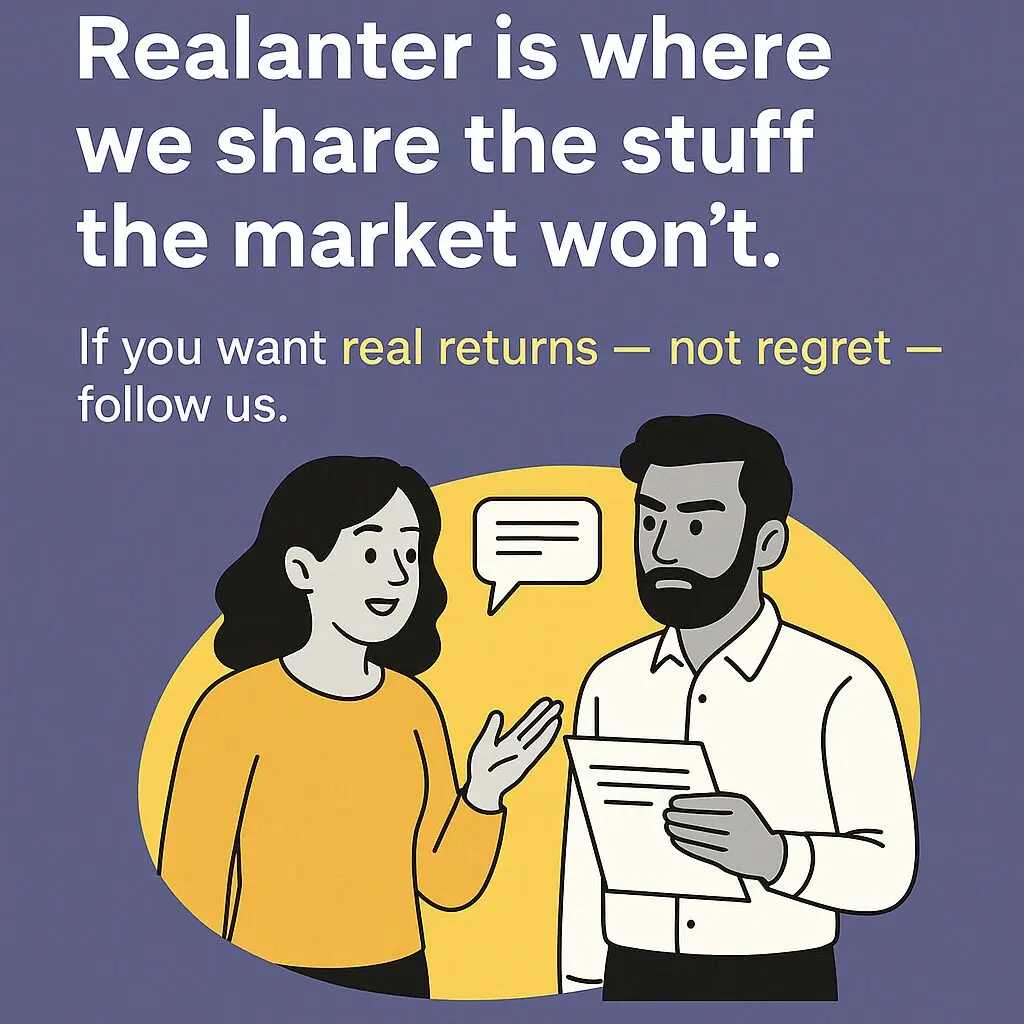
💬 Realanter is where we share the stuff the market won’t
If you want real returns — not regret — follow us.




